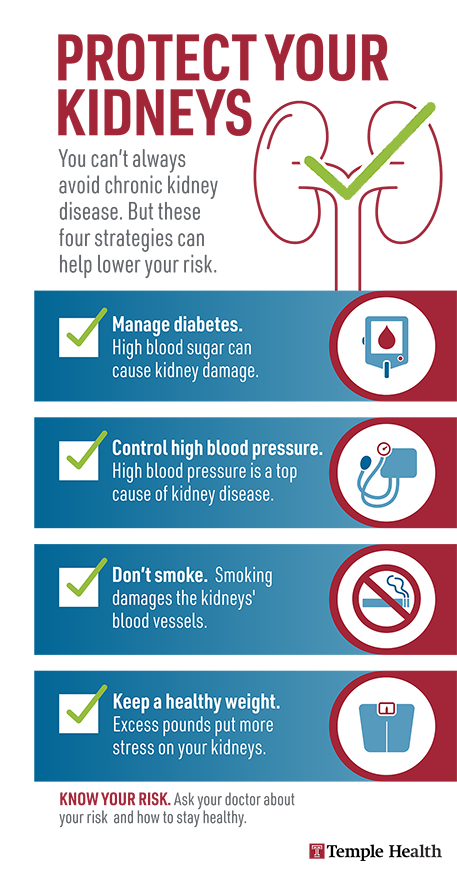An estimated 1 in 3 U.S. adults is at risk for chronic kidney disease (CKD) — and many of them don’t know it. That’s a problem, because knowing your risk can help you protect yourself.
Of the 1 in 7 Americans with CKD, up to 90% may not know they have it. If you know you’re at increased risk of CKD, you can get the screenings you need to catch it early. As a nephrologist, I tell my patients that starting treatment early may help them avoid or delay the need for a kidney transplant or dialysis.
Knowing you are at increased risk can do more than help you detect it sooner — it may help you prevent the disease altogether. That’s because CKD is often caused by other health problems. Managing those problems can help you keep your kidneys healthy.
Here’s what I wish everyone knew about their risk for CKD and what they can do to protect their health.
Chronic kidney disease: Early detection matters
I explain to my patients that CKD is a progressive disease. Progressive means that there's no cure and that the condition gets worse over time. In its later stages, the condition can be managed with dialysis or a kidney transplant, but early treatment can help you delay or avoid the need for those treatments. Knowing your risk can help you get the screenings you need — or recognize the subtle symptoms of early CKD.

Because CKD is usually caused by another condition, having certain health problems is a major risk factor to be aware of. Those include:
- Diabetes
- Glomerulonephritis (inflammation of the filters in the kidneys)
- High blood pressure (hypertension)
- Kidney cancer
- Lupus nephritis (a complication of lupus, an autoimmune condition, that causes the body’s own immune system to attack and damage the filtering system of the kidneys)
- Polycystic kidney disease (an inherited condition in which cysts form in the kidneys, causing them to lose function over time)
Among people whose health conditions raise their risk, certain factors can make CKD more likely. Some of those are risk factors you may be able to control, such as being at a higher body weight or using cigarettes. But some risk factors simply signal a need to be vigilant about screening and pay attention to possible warning signs of the disease. Those include
- Your age. CKD is more likely to affect people 65 and older.
- Your family history. Your risk for CKD goes up if a close family member has been diagnosed with it.
- Your race or ethnicity: People who are African American, Hispanic, Native American, or Asian American are more prone to CKD.
If you’re at risk for CKD, your primary care physician can monitor you for possible signs of the condition. That's easy to do with a simple urine test, which can check for protein or certain waste products. High levels of either could mean that your kidneys aren't functioning at their best. If that is the case, you'll undergo additional urine, blood, or imaging tests to confirm whether you have CKD. In cases of more advanced CKD, your doctor may refer you to a specialist for a biopsy of your kidney tissue.
You can reduce your risk of chronic kidney disease
CKD — like the conditions that cause it — isn’t always avoidable. But there are steps you can take to help to protect your kidneys. Here’s what I recommend:
Manage diabetes and high blood pressure. I tell my patients that CKD is a secondary disease — meaning that it’s usually caused by another health problem. In fact, about two-thirds of all CKD cases are caused by just two conditions: Diabetes and high blood pressure. Controlling blood sugar and blood pressure are two of the most effective ways to avoid CKD or prevent further kidney damage.
Stop smoking. Cigarette use damages the kidney’s blood vessels, which can lead to CKD.
Maintain a healthy weight. Excess body weight puts more stress on the kidneys. And excess weight may contribute to high blood pressure or diabetes and raise levels of inflammation that could damage the kidneys.
Chronic kidney disease symptoms are subtle
The tricky thing about CKD is that it doesn't always cause symptoms early on. People often don't notice that something is wrong until a doctor sees that their kidneys have sustained a lot of damage. At this point, the kidneys have become much less efficient at filtering waste and fluid out of the blood, so symptoms are likely to become more noticeable.
- Knowing that you are at risk for CKD can help you notice possible symptoms and seek medical care — and a diagnosis — sooner. In its earlier stages, symptoms of CKD may include:
- Feeling more tired or having less energy than usual
- Trouble thinking clearly
- Decreased appetite and nausea
- Trouble sleeping
- Dry or itchy skin
- Muscle cramps, especially at night
- Swollen feet or ankles
- Puffiness around your eyes, especially in the morning
- Urinating more (especially at night) or less than usual
- Foamy, frothy, or bubbly-looking urine (this means your urine contains more protein than normal)
- Trouble catching your breath
You can take the first step
If you are at risk for chronic kidney disease, talk to your doctor. They can help you learn how best to reduce your risk — and make sure you get the screenings you need to catch CKD early.
Specialized care can help. Schedule an appointment or call 800-TEMPLE-MED.
Helpful Resources
Looking for more information?